We are developing the social individualist meta-context for the future. From the very serious to the extremely frivolous... lets see what is on the mind of the Samizdata people.
Samizdata, derived from Samizdat /n. - a system of clandestine publication of banned literature in the USSR [Russ.,= self-publishing house]
|
A law firm I use sends out a regular newsletter to their business clients. This arrived in my mailbox some time back. At first I just read it and thought ‘interesting’. But reading it again, I think it may be of interest to some Samizdatistas.
Sections 1 and 2 seem reasonable enough. Section 3 is iffy. But, starting with section 4, some things definitely look like, if actually enforced, they will have a substantial effect on business in China and its overall economic trends. Things like this are what may provide concern for China’s continued economic growth:
Company Rules
Current Law – With no guidance or requirements in the current law, employers often draft their own employee handbooks, manuals and work rules. Enforcement is very similar to that in the United States, with fairness and degree of conduct weighed.
Draft Law – Essentially, every employer policy, rule and procedure that governs its employees must be discussed and approved by the union or employee representative. Rules unilaterally imposed by the employer will be void. The term “employee representative” is new and remains undefined in the draft law. There are also unique challenges for employers posed by this new provision. This provision fails to recognize the fluid nature of employer policies and rules. As stated, every change must be approved by the trade union or employee representative, which will inevitably lead to delay in timely implementation. And, despite the trade union’s power to effect employee policies and rules, an employer is ultimately on the hook for what is implemented. Finally, it is worth noting that this provision does not contain any incentive for the trade unions and/or employee representative to negotiate with employers.
We have a lot of commenters and contributors who travel to China; presumably some of them have business there. I would be interested in knowing what they think of these proposed labor market reforms. Will China actually try to enforce all of these parts of the law, or is it just for show? And if they do enforce it, what will the repercussions be?
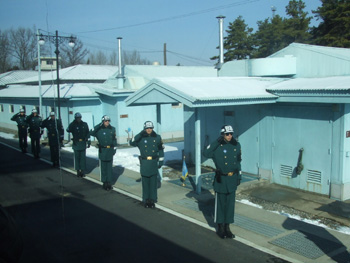 As I have recounted, on my way home to see family in Australia in December I stopped in South Korea for a few days. The trip was principally a city break: I had a look around Seoul. Seoul was in many ways very impressive, but it was also a city striking in its normality. It is a modern, technologically advanced city. The subway system works extremely well. There are McDonald’s and Starbucks outlets everywhere (this is a rare market where a local McDonald’s clone has apparently outdone the original. On the other hand, all Korea’s coffee shops belong to Starbucks). Buildings are modern. People love their mobile phones. Certain Korean brands are perhaps more prominent than they would be in a more balanced economy and they seem to realise this though. Samsung and LG, for instance, seem to market many of their products under local brand names, leading to iconic and very familiar Korean products being present in Korea only under unfamiliar brand names. The city feels extremely safe, it is very clean, and it is about as low stress a place to visit as can be imagined.
The only hint that complete insanity begins less than 50km to the north is only a small one: the fact that uniformed soldiers are to be seen regularly on the streets. There is nothing threatening or remarkable about this. These are just ordinary 19 year old guys in the middle of their compulsory military service. You see them catching the subway, or having lunch in fast food restaurants. These are just young guys going about their lives, who happen to be wearing fatigues. There are many other cities where you will see the same thing. However, now that most developed countries have abandoned compulsory military service, these cities are fewer than they used to be, particularly in countries as advanced as South Korea.
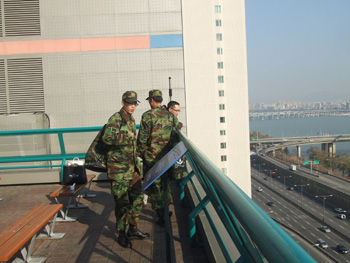 But Korea has retained compulsory military service, and this is because the most heavily defended border in the world lies less than 50km north of Seoul. Of course, I had to go to see it. One can only go into the Demilitarized Zone by going on an organised tour. These are run by both the local USO and by local Korean tour companies. The guidebook recommended the USO tour as “the best tour” but the days on which it ran were not convenient with my schedule, so I booked myself on one of the locally run tours. This turned out to be just fine. However, perhaps because most English speakers go on the USO tour, English speakers were in a minority on this tour. Most of the people on the bus were Japanese. Only six of us were English speakers (myself, three Singaporeans, and an American engineer based in Seoul who was on the tour with his adult daughter who was visiting him for Christmas). There was also a Korean couple. This is apparently rare. Korean civilians are not normally allowed in the DMZ, and those that wish to go on the tour have to apply six months in advance, in which time a thorough background check is undertaken on them, apparently to make sure they are not the sorts of people who are likely to wish to defect to North Korea or otherwise allow the enemy to gain propaganda points (this seems like a deeply peculiar thing to do, but apparently once in a while someone is nutty enough to want to try it). In any event, their presence on the tour was apparently quite unusual, as the English speaking guide remarked upon their presence. And of course, there was no ‘Korean speaking guide’ (although the guides were both Korean and thus clearly spoke the language). The tour was conducted in Japanese and English, and the English and Japanese speaking guides took turns to speak.
When you drive north from Seoul, you realise what a huge metropolitan area the city is at the centre of. (It depends how you measure it, but there is a case for Seoul as the second largest city in the world, which is doubly impressive given that the population was reduced to a few hundred thousand during the Korean War). Urban areas and manufacturing centres are beside the road almost all the way to the border (the LG/Phillips LCD display factory is no more than 10km from the DMZ, so our flat screen television supply is one of the first things we shall lose upon the start of World War 3).
As we drove north the guides gave us various useful pieces of information, such as that we should not run off into the bushes “as there are many minefields”, and that it was very important that we not taunt or gesture at any North Koreans, as if we did they would take our photographs and use them for propaganda purposes against the free world (also, our tour would likely be terminated immediately).
Then we crossed the river Imjin,and normality ceased. → Continue reading: A trip to the DMZ
I came across the Moses Wine novels of US blogger Roger L. Simon after reading his blog a few months. Blogging has opened my eyes to authors I might never have encountered before, and I am sure many readers of this site probably had similar experiences. I am a fan of John Scalzi’s science fiction books, for example, and came across them after seeing favourable mentions over at Instapundit. And so on.
I have been enjoying Roger’s book, Peking Duck, which relates the tale of Moses Wine’s trip to China in the late 1970s during the years immediately after the death of Chairman Mao. Wine is persuaded to go on a trip with a bunch of liberal-leftist writers, publishers, fashion models and various other Californians by his Aunt Sonya, who is a sort of ageing communist straight out of central casting. The group with whom Wine travels are shits of varying degrees of ghastliness, egomania and falseness. The book flags up Roger Simon’s own gradual shift away from socialism and Wine’s own observations on China and his travelling companions are well observed, all the more so for not being overtly political. It is a fictional version of PJ O’Rourke’s wonderful article, ‘Ship of Fools’, which depicted a group of far-left travellers to the former Soviet Union in his book, Republican Party Reptile.
The fondness among a certain demographic for communist and repressive regimes has not died out. By coincidence, blogger Matthew Sinclair recently fisked an appalling piece of flim-flam by the British writer Will Hutton, who can still not bring himself to acknowledge the full scale of the slaughter perpetrated in Mao’s China. (Hat-tip, ASI blog).
Of course, in reflecting on such matters, we should not forget that on the other end of the spectrum, there were plenty of people, like the Mitfords and so on, who were only too happy to travel to places such as Italy in the 1930s and drool over the supposed efficiency and orderliness of Fascism, or more recently, to defend ‘strong men’ types such as Saddam Hussein. Human capacity for folly is not confined to the left side of the spectrum.
It is some time since the book was published, but as I am increasingly finding due to pressures of time, I only recently managed to finish the book “1421, the Year China Discovered the World”, written by former Royal Naval submariner Gavin Menzies. He writes in the tradition of revisionist historians who, fired by a sense that a group of people have been done a great injustice – the Chinese treasure fleet sailors – puts his own skills to righting a perceived wrong. It is an enthralling read, drawing on Menzies’ own navigational knowledge and seamanship, his thirst for adventure and historical knowledge, and above all, by an almost Sherlock Holmes-like ability to track down awkward facts to build a case.
The case is a pretty powerful one, although there are some holes in it, at least on a first reading. What makes the book enjoyable all the way through is that it does not strike the reader that Menzies is full of that tedious modern desire to debunk the achievements of great men in order to exalt his own cleverness. This trait, this desire to show that certain brave folk have feet of clay, bores me to tears. Menzies reveres Cook, Magellan and other European explorers, but he feels the Chinese, who put together massive fleets of enormous sailing junks, have been the victims of undeserved obscurity.
Without spoiling the book for those who have not read it, what Menzies does is to show how certain maps of the mid and late 15th centuries, used by the Portugese and folk such as Columbus, could not possibly have contained the information in them without someone having done the prior work of charting certain areas. He finds all kinds of evidence: fauna, flora, jewellery, stoneware, and patterns of trade. He shows how the Chinese, centuries before Englishman John Harrison invented his vital chronometer, cracked the problem of accurately measuring longitude. Menzies’ navigational expertise is vital to showing how maps of the Middle Ages, when corrected for certain errors, make sense for the modern navigator (as an amateur yachtsman myself, I find this sort of stuff fascinating).
I have a few problems though with this thesis, although they may not be fatal to it. First of all, the mandarin-run China destroyed pretty much all the known written evidence that the voyages that Menzies writes about took place. Several of the admirals who led the expeditions were killed or disappeared. Thousands of their sailors died or found shelter in the lands on which they were shipwrecked. Although a European monk – converting to Islam to avoid problems, perhaps wisely – apparently sailed on the ships and transmitted evidence of the expeditions, it is often rather hard to see how the details that Menzies uses to base his claim can be assembled coherently. I find it frankly incredible that not one major Chinese sailing officer ever laid down independently verifiable accounts of his actions and voyages and that those accounts were all destroyed. The probabilities of such an outcome strike one as low. Menzies relies to a large extent on informed and clever conjecture. But conjecture is what we have and I am not sure how all this would pass muster in a court of law.
→ Continue reading: The Chinese got there first – quite possibly


Personally I desire himalaya wonderful style. Which means it must be the place for me.
This is just too easy. I am in the Nonhyeon area of Seoul, which is a nice part of town with lots of interesting shops, and some reasonably decent architecture. And a variety of other interesting sights.
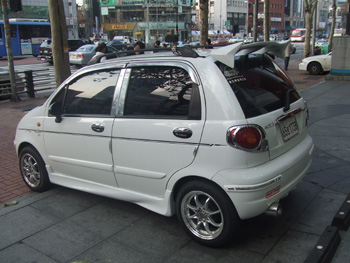
Yes, that is a Daewoo Matiz with spoilers. Really.
Update:


As a Londoner, all I can say is that their profound insight into and authentic reproduction of London’s street fraternity culture is uncanny. Particularly the bit with the skateboard.
It is snowing.
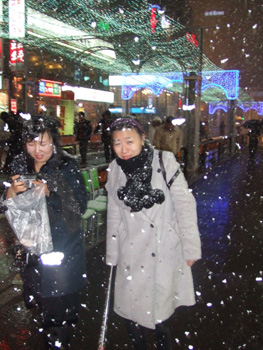
It may be that this is the first snow of the winter, or at least that at does not snow here all that often, because the locals seemed quite excited about it, but did not seem to be particularly well prepared for it.
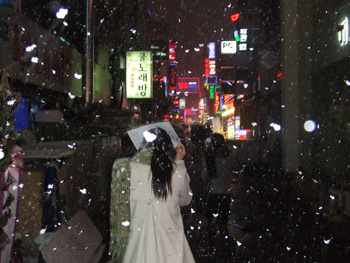
I am here for a few days on my way to Australia for Christmas. So far Seoul seems to be very modern. The new Incheon airport is superb – a wonderful contrast to the horrors of Heathrow yesterday. Like Tokyo, it is a fine city to discover on foot, as there are all kinds of interesting little restaurants, shrines, and all kinds of things down little narrow streets.
More from me over the next few days…
…At least, I hope so. Due to the fact that Korea uses some of the world’s weirdest electricity (220V 60Hz), it did not really occur to me that they would use a standard (continental European) type C plug, so for some idiotic reason I failed to bring a type C adaptor, although I brought most other adaptors known to man. Therefore, until I find an adaptor or a power cable with a different plug on it or something, I have only the small remaining amount of electricity I brought with me from England to power my laptop. In the morning I will go to what my guidebook describes as “the largest electronics market in Asia” where I can hopefully solve this problem. I will also see if it is genuinely larger than electronics markets I have been to in other parts of Asia, and I shall also contemplate the question of where any other bigger electronics markets that are not in Asia might be.
South Korea finally surrenders to one of the finer features of modernity and legalises the miniskirt!

Legal!
I was going try and summon up the enthusiasm to write something about the North Korean nuclear test, but how could I improve upon this?
If I had the chance to put a few questions to the Idiotarians of the world, they would be… if the most repressive regime in the world having nuclear weapons does not bother you, what does? 1
Secondly, if one month ago the US had taken military action to demolish the nuclear research facilities of the North Korean state, you would have accepted (a) that preventing people like the leader of North Korea from getting nukes was a reasonable justification to use force (b) that North Korea even had a nuclear weapons programme?
Just curious. 
1 = and of course the answer is CAPITALISM… and Jews… and BushMcHitler. What is a huge open air prison camp like North Korea compared to that?
The recent typically well mannered coup d’etat in Thailand has been loudly depreciated by the usual people, with calls to ‘return to democratic government’ being made. But in truth in places like Thailand (or Turkey), the military acts as an informal check on the untrammelled political power of democratically elected politicians, rather like the Supreme Court in the United State or (theoretically) the House of Lords in the UK.
Just as the Supreme Court regularly thwarts the ability of impeccably democratically elected politician to pass laws pandering to the vox populi without howls for a ‘return to democratic government’, the military in Thailand is there to stomp on over-mighty politicos who try and break the commonly accepted boundaries of ‘the system’. Well mannered coups are (usually) the norm in Bangkok and should be thought of as a sort of common law ‘House’ of Lords engaging in a political ritual , rather like Black Rod bagging on the door of the Commons, it is just that the Thai ritual involves parking tanks and armoured personnel carriers in front of TV stations.
I take no position on whether of not this particular coup was a Good Idea as I just do not follow the day to day realities of Thai politics closely enough to make an informed guess, but the idea of the military acting as a check on democratic civilian government when conducted like this is really not offensive to me. I just see it as different sort of Supreme Court… with tanks.
News is coming through of a coup in Thailand. Good blogs to check out include 2Bangkok.com and BangkokPundit. Thailand has a historical tradition of army takeovers, but it has not had one for fifteen years or so. A disappointing setback to what I have been told is a quite delightful country.
Steve Edwards relates an interesting story unfolding in the Chinese blogosphere:
Chinese Internet vigilantes have launched a hunt for a self-professed British bounder who has sparked outrage by blogging about his seduction of women in Shanghai. The campaign to uncover the identity of the blogger and have him kicked out of China is the latest in a series of online denunciations that have drawn comparisons with the humiliations inflicted by mobs during the Cultural Revolution.
Traffic on the Sex and Shanghai blog [currently restricted to members only – JW] had surged from 500 hits to more than 17,000, thanks to a swarm of castration threats, anti-British rants and attacks on women who sleep with foreigners.
That some Chinese men are haunted by a sense of sexual inadequacy should come as no surprise – it is a trait that can be uncovered universally. However, there seems a particularly ‘Chinese’ way of expressing this, combining a sense of wounded pride, chauvinism and sexual frustration. I recall similar goings on a few years ago when a young Chinese female author wrote a scandalous (by Chinese standards) book that was subsequently banned. The protagonist, a Chinese teenage girl, got up to all kinds of naughtiness. In the most infamous scene, she has sex with a German in a public bathroom, stating something like “riding his big cock was like sitting on a fire hose”. Such explicit prose brought forth a torrent of outraged letters to the author and messages posted on bulletin boards. Most of them were deeply offended by the sexual encounter with the foreigner, and many threatened sexual violence involving the respondent’s own (presumably fictitious) monster appendage.
The ugly controversy these isolated tales of sexual licence generate obscures – yet also confirms – the fact that generally, Chinese women are probably the most sexually conservative in East Asia. Despite its ostensible headlong rush to modernise and embrace the rest of the world (not an entirely apt metaphor, considering my forthcoming conclusion), such controversies show that much of Chinese society harbours a visceral discomfort with the consequences of throwing open the gates to Johnny Foreigner. This evidently includes large elements of the net-savvy middle class; a demographic that usually has progressive views ascribed to it. Socially, China is still quite an illiberal society, despite the adoption of many Western values. Foreign workers in a city like Shanghai can lose sight of this in the familiar surroundings of expensive consumer goods, rows of the steel and glass churches of capitalism and a general will to party like it’s 1999 amongst the city’s elite and emerging elite. Nevertheless, as this story confirms, conflating the two cultures can still be dangerous; even in the midst of China’s latest Cultural Revolution.
For several days now, there has been speculation that North Korea is about to test one of the nuclear devices it claims to possess. This Guardian article states that
satellites have tracked a special North Korean train, the usual form of transport for Mr Kim, entering Chinese territory.
It does not surprise me at all that China would expeditiously summon Kim in such circumstances; China has the most to lose if North Korea tests a nuclear device.
In many ways, China has profited handsomely from its enduring ‘special relationship’ with North Korea; Beijing’s rapprochement with the West meant it was an ideal conduit between the US and the so-called Hermit Kingdom. Consequently, China has acquired a fair slice of diplomatic prestige from its mediating role in such a critical conflict. However, this cachet is predicated on the assumption that China has a powerful hand in North Korea’s internal affairs – a reasonable assumption, considering North Korea’s reliance on Chinese energy.
However, if Kim Jong-il goes against the express wishes of his Chinese patrons and conducts a nuclear weapons trial, Chinese diplomatic credibility will take a severe blow. This would be bad enough for a leadership obsessed with symbolism. For Chinese planners, an even more serious consequence of North Korea exploding an atomic device would be the reaction of its neighbours.
A probable response to such a grave threat would be to increase military spending markedly. If the threat of a conventional arms race in the region is enough to keep Chinese strategists awake at night, consider the most distasteful consequence of such noisy bellicosity; both Japan and South Korea operate a number of nuclear power stations. They too might decide to go nuclear. Certainly Japan has the materials and technical know-how to assemble a nuclear weapon quickly. It may even possess such devices now, on the (very) quiet. China would be aghast at any new declared nuclear states in the region – such entities would dilute China’s hard-power influence in the region considerably. To say that it is in China’s interest that her technically capable neighbours do not reach their full military potential is extreme understatement.
In light of the way the situation is unfolding over the longer term, it looks as though the American effort to involve China so deeply in the conflict resolution process on the Korean peninsula was a masterstroke. Pyongyang can sabre-rattle all it likes; Chinese interests are the best insurance against Kim Jong-il’s rash impulses becoming outright belligerence. Even if Chinese influence in Pyongyang proves to be less convincing than widely thought, the probable result of this will be Western allies in the region growing militarily stronger to deter a North Korean attack. From an American perspective, this has two attractive benefits. Firstly, it can afford to militarily disengage from the region somewhat, as its allies take up the slack. Secondly, these allies will grow militarily stronger relative to Chinese military power. The latter consequence becomes a useful hedge if China develops into a strategic rival in the future. Chinese involvement in this affair is increasingly looking like a win-any-which-way for the Americans, regardless of the outcome – barring North Korea actually bombing someone, that is.
|
Who Are We? The Samizdata people are a bunch of sinister and heavily armed globalist illuminati who seek to infect the entire world with the values of personal liberty and several property. Amongst our many crimes is a sense of humour and the intermittent use of British spelling.
We are also a varied group made up of social individualists, classical liberals, whigs, libertarians, extropians, futurists, ‘Porcupines’, Karl Popper fetishists, recovering neo-conservatives, crazed Ayn Rand worshipers, over-caffeinated Virginia Postrel devotees, witty Frédéric Bastiat wannabes, cypherpunks, minarchists, kritarchists and wild-eyed anarcho-capitalists from Britain, North America, Australia and Europe.
|













